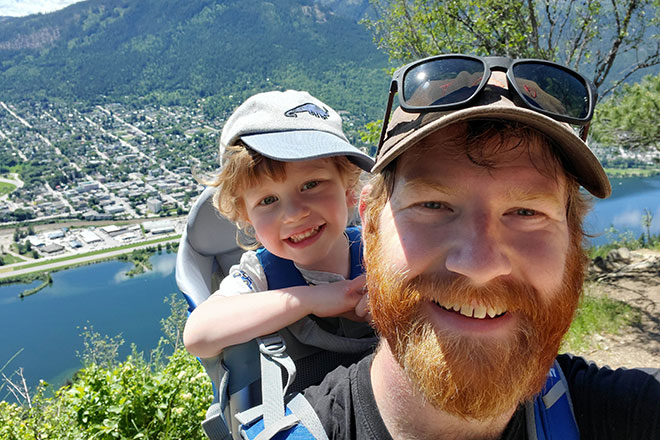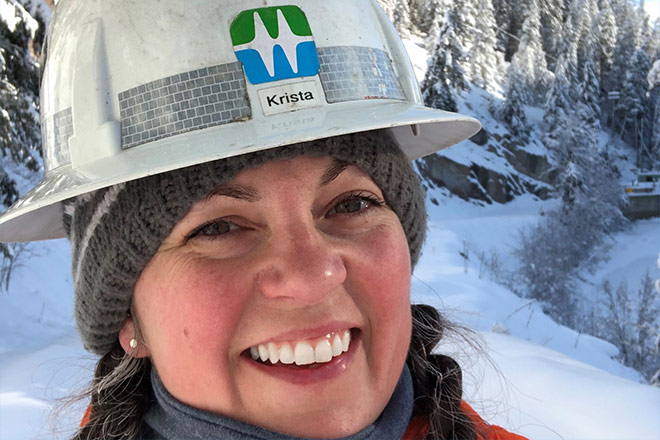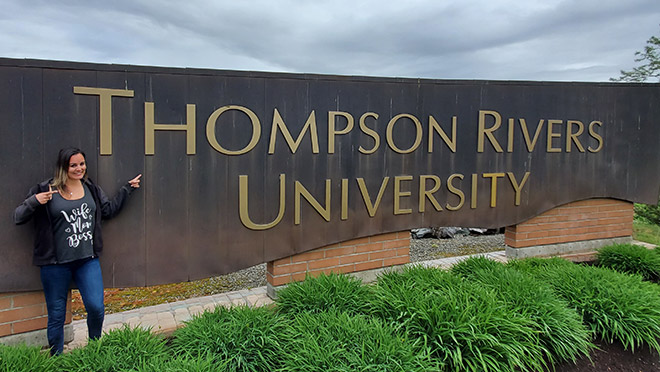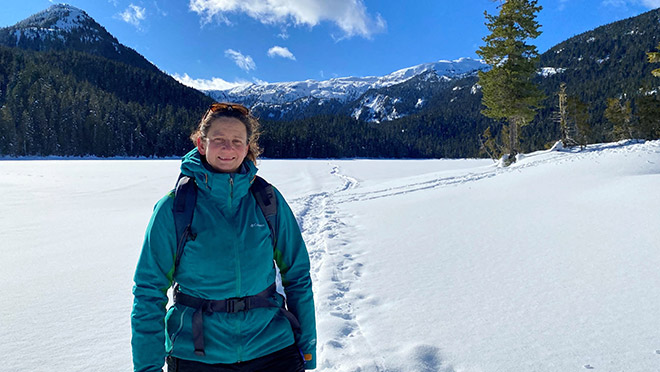The case for a career as a BC Hydro electrician

Good pay, a safety-first culture... and rewarding work
It takes Spencer Hamilton a split-second to respond when asked what's the biggest myth about a career as an electrician at BC Hydro.
"When people think of trades at BC Hydro, they typically think of power line technicians (PLTs)," says Hamilton, an electrical station manager at Campbell River. "These are the trades people most often seen working in the community. But in reality, there are 10 different trades groups working to keep the lights on."
To be fair, there are more than 600 PLTs working for BC Hydro, restoring power and doing maintenance on our extensive network of transmission and distribution power lines across B.C. And it's a dream role for those who get jazzed by the idea of going up in the air in a bucket to fix a power line, including one aspiring PLT who's 6 years old.
But there are many others working in the trades at BC Hydro, including about 230 electricians such as Hamilton, Krista Ohman-Relph, John Cole, and Amit Sanghera, all members of our apprentice electrician sub-committee. And these four clearly love what they do.
"I didn't want to be up in a bucket truck with snow going sideways mixed with a bit of rain," says Cole, a subforeman electrician and trades training instructor who now works out of Nelson. "I wanted to be working on smaller circuits, technical stuff, going through wiring diagrams. And it wasn't until I went back for my second-year electrician schooling and met some electricians working for BC Hydro that I found out that what you do as an electrician here is vastly different from what you might imagine."
We offer apprenticeship opportunities in eight skill areas: electrician, cable splicer, meter technician, power line technician, mechanic, vehicle tradesperson, winder, and interchange plant operator. Apprentices earn 70% of the full trade rate while they learn.
Other training opportunities include pre-apprenticeship power line technician (PLT), engineers-in-training, technologist trainee, and co-op learning. There are also tour guide positions at BC Hydro Visitor Centres, and a youth hires program (summer employment).

Want a BC Hydro apprenticeship? Get your Grade 12 prerequisites
Misconceptions about life in the trades start early. In high school, many teachers (and parents) are unaware of the benefits of, and requirements for, a career in the trades. There's a big emphasis at B.C. schools on the university track, and STEM courses (Science, Technology, Engineering, and Math) due to the range of professions they open up.
But how many people are aware that a lot of those STEM-related courses also apply to trades training with BC Hydro? If you want to apply for a spot as an apprentice electrician at BC Hydro, the first requirement is to have English 12, Math 12, and Physics 12.
"When I graduated high school, I almost had to fight the counsellors at the school to convince them that I was going to be an electrician, because I had pretty good grades and they wanted to point me in other directions," says Hamilton.
Growing up on Vancouver Island, Hamilton considered engineering, but didn't have the money for university. So he took an electrician foundations course right after high school, worked as an apprentice electrician in Edmonton and eventually wound up at BC Hydro.
Cole also experienced pushback, even among his friends, around a life in the trades.
"One of the big misconceptions around trades is that you're going to have this kind of low-paying, basic job where you're just doing wiring and drilling holes," says Cole. "I remember having friends of mine say stuff like, 'Oh, How's Hammers 101? But we work with so many cool pieces of equipment. And I'm rarely going through a day at work where I don't learn something. You're engaged mentally, and you're actually out physically doing something. I think that makes for huge job satisfaction."
Ohman-Relph says she was voted "most likely to go to university" in her Grade 12 year. And that's what she did, until changing her path years later.
"I didn't start with BC Hydro until I was 32," says Ohman-Relph, who lives in Invermere and works as the crew lead at 10 substations and one small generating station in the East Kootenays. "I did a bit of university, but it wasn't my jam. And thankfully, I had the prerequisite courses back in high school. And I finally realized that I just want to be outside. I wanted to work with my hands. I wanted to use my brain, troubleshoot, and problem solve."
What struck Sanghera was the quality of mentorship he was exposed to as an apprentice.
"If you ask the right questions, you always get help," says Sanghera, a Campbell River native who now manages BC Hydro's Vancouver and Burnaby substations. "We have training programs to actually train our journeypersons to become better mentors for apprentices as well."
Be willing to move around B.C.
If you want to train and work in your hometown, a job as a BC Hydro electrician won't likely be your cup of tea. During your 48 months as an apprentice, you'll do on-the-job and in-school technical training for 10 weeks per year. After a probationary period, you'll be required to work in three or four locations around B.C., typically in places like Victoria, Campbell River, the Lower Mainland, Cranbrook, Bridge River, Mica Creek, Prince George, and Hudson's Hope.
"Moving around can be a deal breaker for some folks," says Hamilton, who works in his hometown of Campbell River, but only after doing BC Hydro work at four other locations around B.C. "You need to be willing to move to gain different experience. Every single job in the 40-plus different headquarters is different. So you have to be versatile."
Ohman-Relph grew up in the town of Nanoose Bay on Vancouver Island, started her apprenticeship at BC Hydro's Burrard Thermal plant in Port Moody, then did stints in Nanaimo, Nelson and Surrey before winding up as a crew lead in Invermere. Cole started his apprenticeship in Surrey, then worked in Campbell River, the Mica dam north of Revelstoke, in Vernon, and then in Hudson's Hope before landing in Nelson, a reasonably short drive from his hometown of Trail.
"John Cole probably has more windshield time than all of us," says Sanghera, with a laugh, noting that he's had a lot of Lower Mainland assignments after stints in his native Campbell River and at the Seven Mile Generating Station on the Pend D'Oreille River near Trail.
'It's not safety third, it's safety first'
Not all trades positions in B.C. are created equal. Working in the trades at BC Hydro gives you a minimum three weeks of vacation, plus overtime pay, designated days off with pay, health and vision care, and dental benefits.
It also provides you with the training, regulations, and protective equipment to do the job safely.
"For me, the change from going from a small residential high-rise contractor to working for a company like BC Hydro was significant," says Ohman-Relph. "At BC Hydro, I knew I was safe doing my job, whereas I didn't feel safe when I was working outside of the company. They're not kidding when they say it's not 'safety third'. It's 'safety first'."
The other benefits of working in trades at BC Hydro? Great opportunities for advancement and – as a result of getting paid to learn on the job – a chance to get a leg up financially.
"I saw a government handout that explained how far you'll get ahead by going into a trade first, versus going to university and taking out huge student loans," says Hamilton. "You can afford to buy a house five or six years earlier, so you're really getting ahead."
Related:

